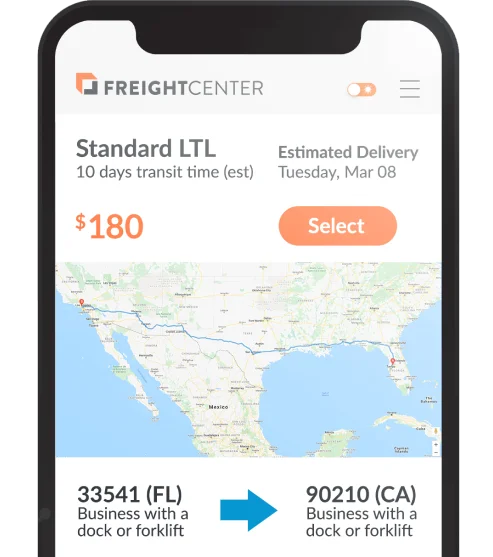
Accessorials
Discover the importance of accessorials in shipping and logistics. Learn how these additional services, such as liftgate, inside delivery, and residential surcharges, can enhance your shipping experience. Explore our comprehensive guide and optimize your freight operations with the right accessorials.
Forgetting to add the necessary freight shipping accessorials to your shipment can result in various costly billing adjustments. No matter what you’re shipping, you must know the accessorials’ role in your freight shipment. Not knowing exactly the extent of additional services you’ll need for your cargo from the start can come back to get you in the form of a billing adjustment. This can happen even after the shipment is completed! We’ll walk you through accessorials and what they are. We’ll also explain why you likely need them so you can ship and shop more affordably and efficiently!
What Are Accessorials?
First things first, what the heck are “accessorials” anyways? These freight shipping services go above and beyond the standard services carriers offer. Which begs the next question, what are the standard services? This refers to curbside pickup and delivery. That means the driver pulls up, loads, or unloads freight at the curb, and moves on. But things aren’t that simple all the time. More often than not, a liftgate might be needed, or the location could have limited access. Or you might want the cargo unloaded or picked up inside rather than at the curb.
All these things require extra labor for the driver and must be appropriately communicated as accessorials when filling out a freight quote and shipment details. If they are not added during the freight quote, and the driver has to add them during the shipping process, such as when loading or unloading, the carrier will charge you a fee after the shipment has been delivered in the form of a billing adjustment. Knowing what add-on services your freight needs is essential to avoid these unwanted fees at the beginning of the freight quote process.
.
We provide competitive freight shipping prices and an all-inclusive, easy-to-use shipping experience for our customers. Exceeding our customers’ expectations results in thousands of satisfied customer reviews and repeat business. We believe in the power of our customer relationships. Check out FreightCenter reviews from real customers, and learn what they have to say about their freight shipping experience!
- 2021, 2017 & 2016 Food Logistics’ Top Green Providers
- 2021 & 2018 Supply & Demand Chain Executives’ Pros to Know: Matthew Brosious
- 2020 & 2019 Top Food Logistics’ 3PL & Cold Storage Provider Award
- 2020 & 2019 Business Observer’s Top 500 Companies on the Gulf Coast
- 2020 & 2017 SmartWay® Transport Partner
- 2020 & 2017 Food Logistics’ Champions: Rock Stars of the Supply Chain
- 2020 Best of Palm Harbor Awards for Local Businesses
- 2017 Green Supply Chain Award from Supply & Demand Chain Executive
- 2017 Tampa Bay Business Journal Heroes at Work
- 2016, 2015, & 2012 Food Logistics Top 100 Software and Technology Providers
- 2013 Tampa Bay Business 100 by Tampa Bay Business Journal
- 2013 Top 100 Great Supply Chain Partners by SupplyChainBrain
- 2012 TIA Samaritan Award Honorable Mention
- 2012, 2011 & 2010 TBBJ Fast 50 Recipient
- 2013, 2011, & 2010 Diversity Business Top Businesses

Who Uses Accessorials?
Accessorials, also known as accessorial charges or additional services, are used by various industries and individuals involved in transportation and logistics. Here are some examples of who uses accessorials:
Shippers: Shippers are the individuals or companies that initiate the transportation of goods. They may use accessorials to request additional services beyond the basic transportation of their goods. For example, they may require special equipment for loading or unloading, need expedited delivery, or ask for a specific delivery time window.
Carriers: Carriers are the companies that provide transportation services. They often charge accessorials to cover the additional costs incurred when fulfilling special requests from shippers. These charges can include fees for detentions, extra stops, driver assist, fuel surcharges, and accessorial services specific to their industry.
Freight brokers: Freight brokers act as intermediaries between shippers and carriers, facilitating the transportation process. They may coordinate with carriers and negotiate accessorial charges on behalf of shippers or themselves. Brokers may charge their own accessorial fees for services they provide, such as freight tracking, documentation, or freight consolidation.
Third-party logistics providers (3PLs): 3PL companies offer comprehensive logistics services, including transportation management. They may utilize accessorials to provide value-added services to their clients, such as warehousing, inventory management, packaging, and specialized handling requirements.
Retailers and e-commerce companies: Retailers and e-commerce businesses rely on accessorials to meet specific delivery requirements. This could include services like inside delivery, white-glove delivery (assembly and installation), appointment scheduling, and return merchandise authorization (RMA) processing.
LTL (Less Than Truckload) and FTL (Full Truckload) carriers: LTL carriers transport smaller freight shipments that do not require a full truck. They often charge accessorials for services like liftgate delivery, residential delivery, limited access pickup or delivery, and notification prior to delivery. FTL carriers, which handle larger shipments that occupy an entire truck, may also charge accessorials for similar services.
Freight forwarders: Freight forwarders specialize in coordinating the movement of goods across different modes of transportation and international borders. They may use accessorials for services such as customs clearance, document preparation, cargo insurance, and storage.
It’s important to note that the specific accessorial charges and services offered can vary between companies and industries. The use of accessorials allows for customization and flexibility in meeting the unique requirements of each shipment or customer.
Types of Accessorials
Accessorials are additional services or charges that can be added to a standard shipment to accommodate specific requirements or circumstances. Understanding the different types of accessorials is crucial for effectively managing your shipping and logistics operations. Here is a detailed explanation of some common types of accessorials:
- Liftgate Service: This service is used when the pickup or delivery location does not have a loading dock or forklift to load or unload heavy or oversized items. A hydraulic liftgate attached to the truck is used to raise and lower the shipment, ensuring safe and efficient handling.
- Inside Delivery: Inside delivery involves transporting a shipment beyond the typical point of delivery, such as taking it inside a building, specific room, or up a flight of stairs. It is often required for large or bulky items that cannot be easily moved by the recipient alone.
- Residential Surcharge: When a shipment is being delivered to a residential address instead of a commercial or business location, carriers may apply a residential surcharge. This charge accounts for the additional time and effort required for deliveries to residential areas.
- Notification Services: These services provide advanced notifications to the recipient about the upcoming delivery. Notifications can be sent via email, phone call, or text message, ensuring that the recipient is aware of the shipment’s estimated arrival time and can make necessary arrangements.
- Redelivery or Reattempt: If a delivery attempt fails due to the recipient’s absence or an incorrect address, a redelivery or reattempt service can be requested. Carriers will schedule another delivery attempt to ensure the shipment reaches its intended destination.
- Inside Pickup: Similar to inside delivery, this service involves the carrier picking up the shipment from inside a specific location, such as a warehouse or designated area. It is useful when the shipper requires assistance in moving the items to the pickup location.
- Hazardous Materials Handling: When shipping hazardous materials, additional precautions and compliance with safety regulations are necessary. Carriers charge a fee for handling such shipments to cover the additional training, equipment, and precautions required for safe transportation.
- Storage: If a shipment needs to be stored at a carrier’s facility for a specified period before delivery, storage charges may apply. This service is useful when the recipient is not immediately ready to receive the shipment and needs temporary storage.
- Trade Show Delivery: For shipments going to trade shows or exhibitions, specific services are available to accommodate the unique requirements of these events. This may include specific delivery timeframes, booth delivery, setup assistance, and coordination with event organizers.
- White Glove Service: White glove service offers the highest level of care and attention to detail for delicate, valuable, or high-end items. It involves specialized handling, extra padding, installation or assembly, and even removal of packaging materials.
It’s important to note that not all carriers offer the same accessorials, and the availability and pricing may vary. When planning your shipments, consider the specific requirements and preferences of your customers and select the appropriate accessorials to ensure a smooth and satisfactory delivery experience.


Which Accessorials are Most Commonly Used?
The accessorial that is used the most can vary depending on the specific industry, shipping requirements, and customer preferences. However, some accessorial services tend to be more commonly used than others due to their widespread applicability. Among the commonly used accessorials, the following are often in high demand:
- Liftgate Service: Liftgate service is frequently used because many pickup and delivery locations do not have loading docks or forklifts. It is especially essential when dealing with heavy or oversized items that require assistance with loading and unloading.
- Residential Surcharge: Since a significant portion of deliveries are made to residential addresses, the residential surcharge is a commonly applied accessorial. It covers the additional time and effort required for deliveries to residential areas.
- Notification Services: In an era of heightened customer expectations and communication, notification services are frequently utilized. Keeping recipients informed about shipment progress and estimated delivery times helps improve customer satisfaction and allows for better coordination.
- Redelivery or Reattempt: When initial delivery attempts are unsuccessful due to various reasons, such as the recipient’s absence or an incorrect address, redelivery or reattempt services are commonly utilized. They ensure that shipments reach their intended destinations without delays.
These accessorials are considered the most commonly used due to their broad applicability across different industries and customer needs. However, the specific usage may vary depending on factors such as the nature of the goods being shipped, the type of customers being served, and the shipping patterns of a particular company or industry. It’s important for businesses to assess their unique requirements and choose the accessorials that best align with their shipping operations and customer expectations.
Accessorial FAQs
Q: What are freight accessorials?
A: Freight accessorials are additional services or charges associated with the transportation of freight that goes beyond the standard freight rate. These services can include extra handling, special equipment, storage, or other non-standard requirements.
Q: Why are freight accessorials charged?
A: Freight accessorials are charged to cover the costs incurred by carriers or logistics providers for providing additional services or accommodating specific requests from shippers or consignees. These charges reflect the extra time, effort, or resources required to meet unique shipping requirements.
Q: What are some standard freight accessorials?
A: Common freight accessorials include:
Liftgate service: A charge for using a hydraulic liftgate to load or unload freight when no loading dock is available.
Inside delivery: Additional fees for delivering freight inside a building or to a specific location within a facility.
Residential delivery: Charges are applied when delivering freight to a residential address rather than a commercial location.
Detention: Fees for waiting at a pickup or delivery location beyond the allotted free time.
Redelivery: Charges incurred when a carrier has to make an additional delivery attempt due to an unsuccessful initial delivery.
Hazmat fees: Extra charges for transporting hazardous materials due to the required specialized handling and safety precautions.
Q: How are freight accessorials typically billed?
A: Freight accessorials are typically billed separately from the standard freight rate. The charges may be based on predetermined rates or negotiated case-by-case basis. They can be listed as separate line items on the invoice or specified in the carrier’s pricing agreement.
Q: Can I negotiate or waive freight accessorials?
A: In some cases, freight accessorials may be negotiable, especially if you have a long-term or high-volume relationship with the carrier or logistics provider. It is advisable to discuss your specific needs with the carrier and explore the possibility of negotiating or waiving certain accessorials. However, remember that not all accessorials may be negotiable, especially those involving third-party services or regulatory compliance.
Q: How can I minimize the impact of freight accessorials on my costs?
A: To minimize the impact of freight accessorials on your costs, it’s essential to communicate your requirements clearly to the carrier or logistics provider. Provide accurate and detailed information about the shipment’s characteristics, pickup and delivery locations, and special handling or service needs. Proper planning, coordination, and proactive communication can help reduce the need for additional services and associated charges.
Remember, the specific freight accessorials and their terms can vary among carriers and logistics providers. It’s always recommended to consult with your service provider to understand their policies, charges, and potential negotiation options regarding freight accessorials.
Accessorial FAQs
Q. What are freight accessorials?
Freight accessorials are additional services or charges associated with the transportation of freight that goes beyond the standard freight rate. These services can include extra handling, special equipment, storage, or other non-standard requirements.
Q. Why are freight accessorials charged?
Freight accessorials are charged to cover the costs incurred by carriers or logistics providers for providing additional services or accommodating specific requests from shippers or consignees. These charges reflect the extra time, effort, or resources required to meet unique shipping requirements.
Q. What are some standard freight accessorials?
Common freight accessorials include:
Liftgate service: A charge for using a hydraulic liftgate to load or unload freight when no loading dock is available.
Inside delivery: Additional fees for delivering freight inside a building or to a specific location within a facility.
Residential delivery: Charges are applied when delivering freight to a residential address rather than a commercial location.
Detention: Fees for waiting at a pickup or delivery location beyond the allotted free time.
Redelivery: Charges incurred when a carrier has to make an additional delivery attempt due to an unsuccessful initial delivery.
Hazmat fees: Extra charges for transporting hazardous materials due to the required specialized handling and safety precautions.
Q. How are freight accessorials typically billed?
Freight accessorials are typically billed separately from the standard freight rate. The charges may be based on predetermined rates or negotiated case-by-case basis. They can be listed as separate line items on the invoice or specified in the carrier’s pricing agreement.
Q. Can I negotiate or waive freight accessorials?
In some cases, freight accessorials may be negotiable, especially if you have a long-term or high-volume relationship with the carrier or logistics provider. It is advisable to discuss your specific needs with the carrier and explore the possibility of negotiating or waiving certain accessorials. However, remember that not all accessorials may be negotiable, especially those involving third-party services or regulatory compliance.
Q. How can I minimize the impact of freight accessorials on my costs?
To minimize the impact of freight accessorials on your costs, it’s essential to communicate your requirements clearly to the carrier or logistics provider. Provide accurate and detailed information about the shipment’s characteristics, pickup and delivery locations, and special handling or service needs. Proper planning, coordination, and proactive communication can help reduce the need for additional services and associated charges.
Remember, the specific freight accessorials and their terms can vary among carriers and logistics providers. It’s always recommended to consult with your service provider to understand their policies, charges, and potential negotiation options regarding freight accessorials.
